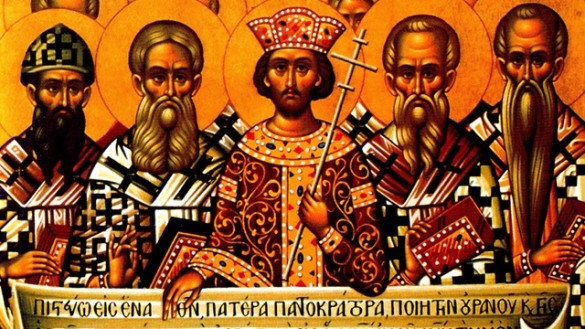LifeWay Research has released a new study on the views of modern American Christianity and, not surprisingly, heresy is running rampant through even the more conservative groups. The study breaks the participants down into the following groups (% of total U.S. population): Black Protestants (8%), Catholics (22%), Evangelicals (19%), Mainline Protestants (15%), and Non-Christians (27%).1 The split between Evangelicals and Mainline Protestants is roughly the conservative/liberal divide I’ve discussed before. Predictably, liberal Mainline Protestants score poorly across the board, with one half to two thirds usually holding a heretical position. Catholics also score rather poorly; how much of this is due to lapsed Catholics and Hispanic Catholics skewing the vote is open to debate. Black Protestants are generally in line with Evangelicals, which is why the two are usually grouped together.2
The Evangelical category has some bright spots, but is also very troubling that significant portions hold to heretical Arian, Pneumatomachian, and Pelagian views in the category which includes most of America’s white conservative Protestants.
Evangelicals did score high on several points. Nearly all believe that Jesus Christ rose from the dead (96%), and that salvation is found through Jesus alone (92%). Strong majorities said that God is sovereign over all people (89%) and that the Bible is the Word of God (88%).3
Arianism
Arianism is belief that God the Father is more fully divine than God the Son and that the Father created the Son. In 325 A.D., the First Council of Nicaea rejected Arianism as heresy, affirming that both Father and Son were of the same eternal substance (homooúisios).
Almost all evangelicals say they believe in the Trinity (96%) and that Jesus is fully human and fully divine (88%).
But nearly a quarter (22%) said God the Father is more divine than Jesus, and 9 percent weren’t sure. Further, 16 percent say Jesus was the first creature created by God, while 11 percent were unsure.
So a full fifth of Evangelicals are Arians, with another tenth unsure.
Pneumatomachianism
The Pneumatomachi were a semi-Arian sect which held similar views to God the Spirit as Arians did to God the Son. They held that God the Spirit was of a different essence from the Father and Son, or was just an impersonal force. This view was rejected as heresy by the First Council of Constantinople.
But if evangelicals sometime misunderstand doctrines about Jesus, the third member of the Trinity has it much worse. More than half (51%) said the Holy Spirit is a force, not a personal being. Seven percent weren’t sure, while only 42 percent affirmed that the Spirit is a person.
And 9 percent said the Holy Spirit is less divine than God the Father and Jesus. The same percentage answered “not sure.”
So fully half of Evangelicals are semi-Arians in their view of God the Spirit.
Pelagianism
Pelagian was a fourth-century monk who taught, contra Ephesians 2:1, that original sin did not prevent man from being able to choose to do good, and that man must act first in choosing God and salvation. Multiple church councils in the fifth and sixth centuries rejected both Pelagianism and semi-Pelagianism as heresy, affirming that everything in salvation originates from God, that He is the instigator.
Human nature and salvation were other areas of confusion for respondents. Two out of three (68%) said that a person obtains peace with God by seeking God first, and then God responds with grace. A similar percentage (67%) said people have the ability to turn to God on the own initiative. Yet half (54%) also think salvation begins with God acting first.
So two thirds of Evangelicals are at least semi-Pelagian in their views of salvation.
Other Heresies
In addition to Arianism, Pneumatomachianism, and Pelagianism, 19% of Evangelicals believe in multiple paths to heaven, 24% of Evangelicals believe the Bible is not 100% accurate, and 51% of Evangelicals believe man is basically good.4 The theological illiteracy runs deep even among what should ostensibly be the most conservative orthodox group on the list.
Takeaway
Remember this survey the next time a modern “Christian” starts pontificating about bigotry, tolerance, racism, sexism, or whatever else the liberal flavor of the month might be. 96% of Evangelical Protestants believing in the Trinity is meaningless when half of them are holding heretical views on the persons and relationships within the Trinity. No wonder the modern “church” holds Unitarian views on race, gender, and society. But this group of heretics and theological illiterates comprising the modern church think that they, after 1,900 years of church error, have finally gotten the Christian view of race, gender, and social justice correct. I personally find that to be a preposterous proposition.
Footnotes
- http://en.wikipedia.org/wiki/Religion_in_the_United_States#Statistics ↩
- http://www.wheaton.edu/ISAE/Defining-Evangelicalism/How-Many-Are-There ↩
- http://www.christianitytoday.com/ct/2014/october-web-only/new-poll-finds-evangelicals-favorite-heresies.html?start=1 ↩
- http://www.lifewayresearch.com/2014/10/28/americans-believe-in-heaven-hell-and-a-little-bit-of-heresy/ ↩
| Tweet |
|
|
|





